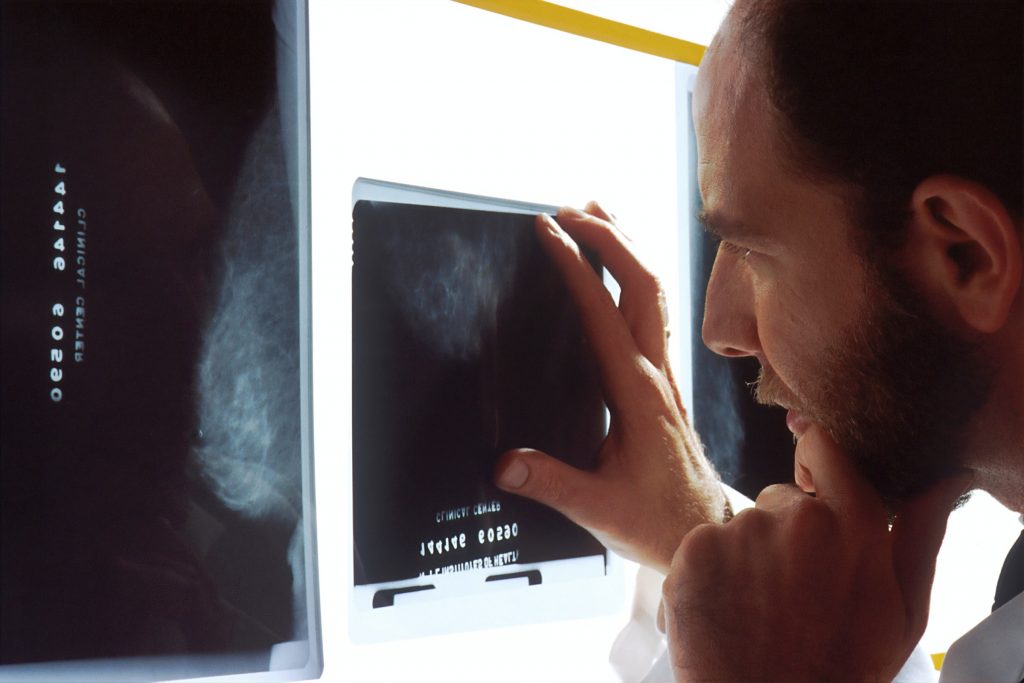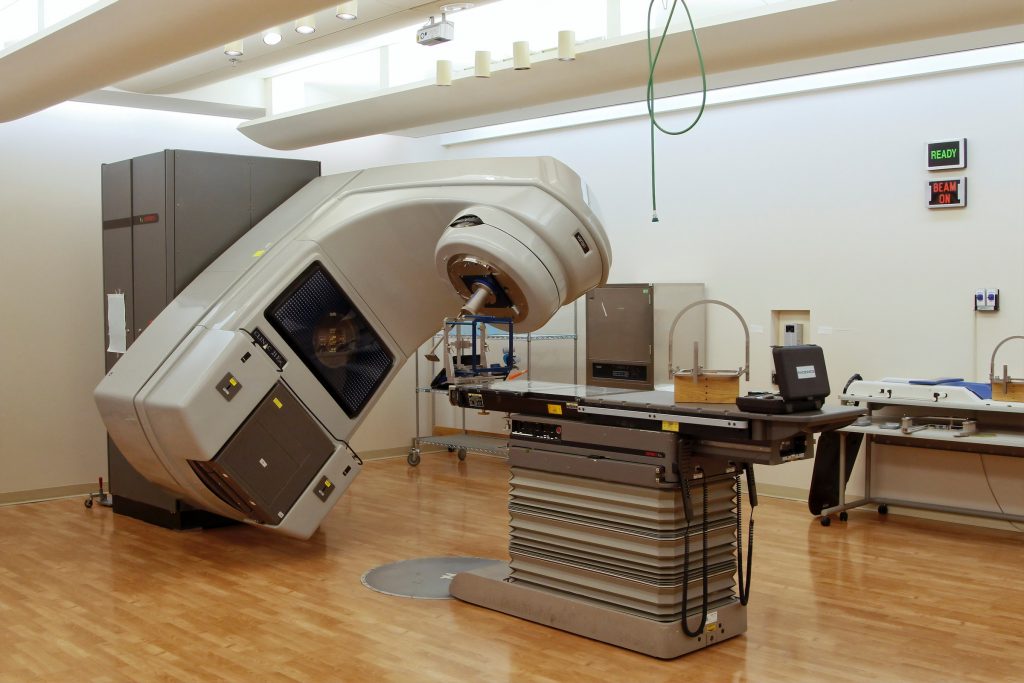
If you have ever thought about a career as a radiation therapist, you will be helping patients that have been diagnosed with cancer.
Radiation therapists work with technology within the healthcare industry.
Because they are often treating the same patients throughout their treatment program, radiation therapists have more interaction with the same patients, than other healthcare workers.
According to Northwestern Health Sciences University, here are the key responsibilities that a radiation therapist can expect to perform daily:
- Using technology and imaging equipment to direct radiation to the proper area.
- Understand how to use the equipment to deliver the radiation.
- Explain to the patient the process to put them at ease.
- Answer any questions, concerns, or questions they may have about their treatment.
- Assess the patients’ mental, emotional and physical state and address any concerns during the course of the treatment.
- Help patients understand the course of treatment, outcomes, and possible side effects.
- Chronicle patient care in medical records so all medical staff caring for the patient has access to their updated records at all times.
Page Navigation
- What Are the Pros of Being a Radiation Therapist?
- What Are the Cons of Being a Radiation Therapist?
- What Type of Education do You Need to Become a Radiation Therapist?
- What Courses You Can Expect to Take:
- What Can You Expect to Earn As a Radiation Therapist?
- Other Possible Jobs for a Radiation Therapist:
- Should You Become a Radiation Therapist?
- Pros and Cons of Being a Radiation Therapist Summary Table
- Sources
What Are the Pros of Being a Radiation Therapist?

Anyone in the healthcare industry is a hero to those that are struggling with health ailments, no matter how serious or minor.
Here are some of the benefits to those that pursue a career in radiation therapy:
Help Others That Are Ill
A radiation therapist plays a crucial role in the medical care of cancer patients.
You are helping to treat their medical issue.
Be a Support System
You will act as a support system for the patients and their families while administering radiation therapy.
Get to Know Your Patients
Because there is so much time being spent with the patients, you will have the opportunity to get to know them and follow their progress, which is greatly rewarding.
Flexible Work Schedule
You will be able to have a flexible work schedule. In most cases, you will know in advance what your work schedule is, so you can plan accordingly to have plenty of personal and family time.
Typically, radiation therapists work Monday through Friday.
Various Work Settings
As a radiation therapist, you will work in a variety of settings including hospitals, out-patient facilities, and medical clinics.
There is also a possibility that you may work for the pediatric center to provide treatment to children that are diagnosed with cancer.
You Will Have Job Security
You have a job that is very much in demand with the growing rate of cancer.
According to the Bureau of Labor Statistics, the need for radiation therapists is expected to grow 9% by 2028.
This is higher than the average employment rate.
Those considering studying to become a radiation therapist will have an easy time getting a job if they are skilled.
Easy Entree Into Healthcare Market
Those that begin their career as radiation therapists often find that they want to pursue higher-level jobs in the healthcare industry.
They may also meet other colleagues or mentors that encourage them to look into other jobs.
Many go on to service radiation equipment to further their education.
What Are the Cons of Being a Radiation Therapist?

A Lot of Time on Your Feet
There is a lot of standing so those that have back, and leg issues may have a problem with the amount of standing required.
Heavy Lifting
You will be tasked with helping patients move from area to area for treatment, so if you don’t have much body strength you may have a problem moving larger-framed patients.
Bad Outcomes Can Be Difficult
You will get to know the patients and their family members, and it may be difficult if there are negative outcomes.
Cost and Time Investment
You will need to invest time and money to become a certified radiation therapist.
Can Make More Money in Other Healthcare Jobs
More money can be made by those looking to invest more time and money into their education to garner a higher-level position.
Busy, 40-hour Work Weeks
Because of the high demand, most radiation therapists are required to work a full 40-hour weekly shift.
You Must Be Organized
This means getting people getting in and out of the facility, keeping records up to date.
What Type of Education do You Need to Become a Radiation Therapist?
You will need to get the proper education before you can become a radiation therapist.
Many complete an associate degree program and then go on to get a certificate in radiologic technology.
Some prefer to take a bachelor’s degree program specifically designed for those looking for a career in radiation therapy.
In some cases, depending on the school, some will enable students with a GED or high school diploma to enroll in a radiation therapy program.
In this case, there may be additional steps needed such as writing a personal essay, personal and professional references, and passing a criminal background check.
The time to complete training depends on the program and credentials.
In most cases, the program can vary from one to four years from start to completion.
Of course, if you take classes on a part-time basis, the educational program will take more time.
What Courses You Can Expect to Take:
Those that are planning for a career as a radiation therapist can expect to take a wide range of courses, according to NWHSU’s Radiation Therapy Program:
- General education courses in anatomy, physics, math, communication, and social sciences
- Program-specific courses related to radiation therapy, including:
- Medical terminology
- Cancer terminology
- Radiation physics
- Anatomy
- Radiation protection skills
- Treatment planning
- Treatment skills and processes
After coursework is completed, each student mst accept an internship of around 6-9 months.
Different areas of the U.S. have different pay scales based on the area and demand.
In addition to a generous income, radiation therapists also get a full range of benefits like health insurance, dental insurance, and retirement plans.
In addition, there are also often opportunities for personal development and career advancement.
Different areas of the U.S. have different pay scales based on the area and demand.
In addition to a generous income, radiation therapists also get a full range of benefits like health insurance, dental insurance, and retirement plans.
In addition, there are also often opportunities for personal development and career advancement.
What Can You Expect to Earn As a Radiation Therapist?
According to the Employment Development Department, those that choose a career as a radiation therapist can expect to earn around $126,132, in the state of California.
This translates to $60.73 per hour.
According to BusinessInsider.com, radiation therapists rank as #7 on its list of The 40 Highest-paying jobs you can get in the healthcare field without a bachelor’s degree.
One thing is certain, healthcare workers will continue to earn good salaries because they are in demand.
Our population is aging, and unfortunately, cancer is still a leading cause of death for many people in the U.S. and beyond.
As long as people still rely on radiation treatments to treat cancer, radiation therapists and technicians will have job security.
Other Possible Jobs for a Radiation Therapist:
If you thought that as a radiation therapist you would be working in the same place, you may be wrong.
With the increased need for healthcare workers, new healthcare jobs have arisen to fill the growing need for healthcare personnel outside the local environment.
Radiation therapists are in demand, and they also have a very good rate of pay, but choosing to be a traveling radiation therapist can earn an individual with experience and a good work record top pay.
Of course, they would need to travel to wherever the need was greatest.
A traveling radiation therapist can sign up with job/career service specialists who look for open jobs and fill them with skilled radiation therapists.
In most cases, the medical worker will know in advance where they are going, how long they will be gone, and the rate of pay.
Typically, a contract is drawn up with all the specifics.
The result is doing the job you were trained to do outside your local community, into less served areas, for top-level pay.
Traveling radiation therapists also get free housing and transportation.
So, for those that don’t have families, this could be a very good option to gain experience while making top dollar.
Should You Become a Radiation Therapist?
If you have a need to help people and want to be in the healthcare industry, becoming a radiation therapist can be a great opportunity for you.
As a radiation therapist, you will have an entrée into the healthcare world, from there many people decide to continue their education and move up into different jobs at a higher pay level.
So many try out radiation therapy to see if they are attuned to the work environment that the healthcare industry offers.
Pros and Cons of Being a Radiation Therapist Summary Table
| Pros of Being a Radiology Therapist | Cons of Being a Radiology Therapist |
|---|---|
| Help Others That Are Ill | A Lot of Time on Your Feet |
| Be a Support System | Heavy Lifting |
| Get to Know Your Patients | Bad Outcomes Can Be Difficult |
| Flexible Work Schedule | Cost and Time Investment |
| Various Work Settings | Can Make More Money in Other Healthcare Jobs |
| You Will Have Job Security | Busy, 40-hour Work Weeks |
| Easy Entree Into Healthcare Market | You Must Be Organized |






